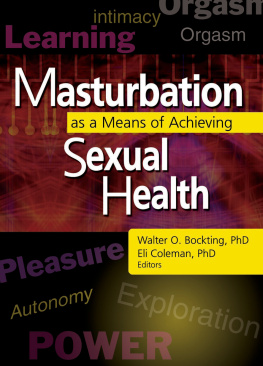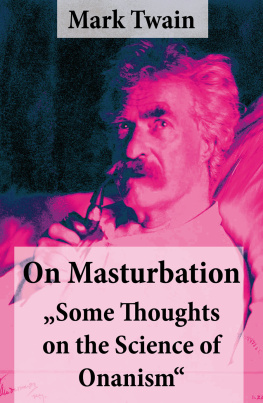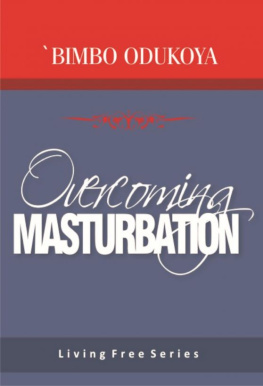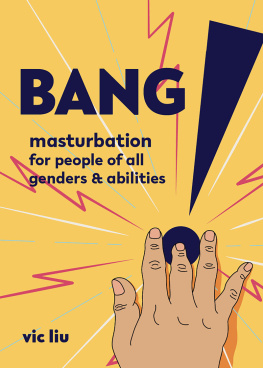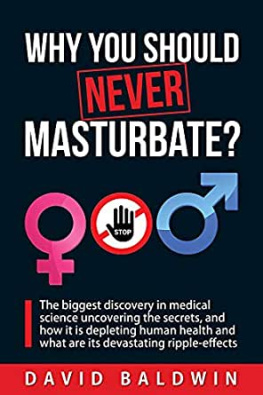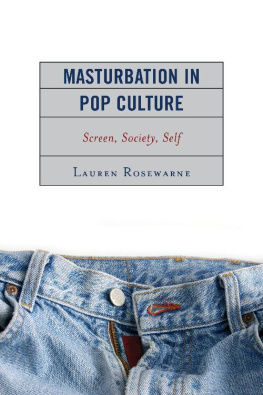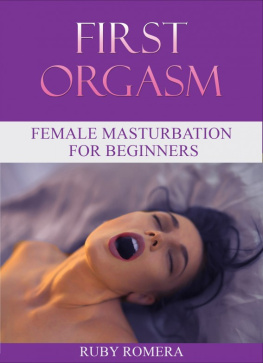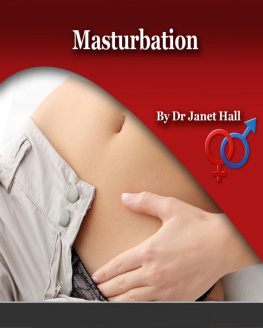Masturbation as a Means of Achieving Sexual Health
Masturbation as a Means of Achieving Sexual Health has been co-published simultaneously as Journal of Psychology & Human Sexuality, Volume 14, Numbers 2/3 2002.
Masturbation as a Means of Achieving Sexual Health
Walter O. Bockting, PhD
Eli Coleman, PhD
Editors
Masturbation as a Means of Achieving Sexual Health has been co-published simultaneously as Journal of Psychology Human Sexuality , Volume 14, Numbers 2/3 2002.
Masturbation as a Means of Achieving Sexual Health has been co-published simultaneously as Journal of Psychology & Human Sexuality , Volume 14, Numbers 2/3 2002.
2002 by The Haworth Press, Inc.
All rights reserved. No part of this work may be reproduced or utilized in any form or by any means, electronic or mechanical, including photocopying, microfilm and recording, or by any information storage and retrieval system, without permission in writing from the publisher.
The development, preparation, and publication of this work has been undertaken with great care. However, the publisher, employees, editors, and agents of The Haworth Press and all imprints of The Haworth Press, Inc., including The Haworth Medical Press and Pharmaceutical Products Press, are not responsible for any errors contained herein or for consequences that may ensue from use of materials or information contained in this work. Opinions expressed by the author(s) are not necessarily those of The Haworth Press, Inc. With regard to case studies, identities and circumstances of individuals discussed herein have been changed to protect confidentiality. Any resemblance to actual persons, living or dead, is entirely coincidental.
First published & cover design by
The Haworth Press. Inc., 10 Alice Street, Binghamton, NY 13904-1580 USA
This edition published 2012 by Routledge
Routledge
Taylor & Francis Group
711 Third Avenue
New York, NY 10017
Routledge
Taylor & Francis Group
27 Church Road, Hove
East Sussex BN3 2FA
Library of Congress Cataloging-in-Publication Data
Masturbation as a means of achieving sexual health / Walter Bockting, Eli Coleman, editors.
p. cm.
"Co-published simultaneously as Journal of psychology & human sexuality, Volume 14, Numbers 2/3 2002."
Includes bibliographical references and index.
ISBN 0-7890-2047-5 (hard: alk. paper) ISBN 0-7890-2046-7 (pbk: alk. paper)
1. Hygiene, Sexual. 2. Masturbation. I. Bockting, Walter O. II. Coleman, Eli. III. Journal of psychology & human sexuality.
RA788 .M338 2003
613.9'5dc21
2002152624
Masturbation as a Means of Achieving Sexual Health
Contents
| Walter O. Bockting, PhD |
| Eli Coleman, PhD |
| Vern L. Bullough, PhD, RN |
| Arne Dekker, Dipl. Soz. |
| Gunter Schmidt, PhD |
| Osmo Kontula, PhD |
| Elina Haavio-Mannila, PhD |
| Beatrice "Bean" E. Robinson, PhD |
| Walter O. Bockting, PhD |
| Teresa Harrell, PhD |
| Steven D. Pinkerton, PhD |
| Laura M. Bogart |
| Heather Cecil |
| Paul R. Abramson |
| Brian D. Zamboni, PhD |
| Isiaah Crawford, PhD |
About the Editors
Walter Bockting, PhD, is a Licensed Psychologist and Assistant Professor at the Program in Human Sexuality, Department of Family Practice and Community Health, at the University of Minnesota Medical School in Minneapolis. He is also on the graduate faculty of the University's Center for Advanced Feminist Studies. Dr. Bockting is a native of The Netherlands and received his PhD from the Vrije Universiteit in Amsterdam. For the past 15 years, he has worked as a psychotherapist assisting clients with a large variety of sexual concerns. In addition, he teaches medical students, residents, and psychologists in human sexuality. His research interests include gender identity, HIV/STD prevention, and the promotion of sexual health. He has published and presented at many national and international scientific conferences on these topics. Dr. Bockting is the author of Transgender HIV Prevention: A Minnesota Response to a Global Health Concern, and editor of the International Journal of Transgenderism, Gender Dysphoria: Interdisciplinary Approaches in Clinical Management (The Haworth Press, Inc.), and Transgender and HIV: Risks, Prevention, and Care (The Haworth Press, Inc.). He is a member of the Board of Directors of the Harry Benjamin International Gender Dysphoria Association and a past president of the Midcontinent Region of the Society for the Scientific Study of Sexuality.
Eli Coleman, PhD , is Director of the Program in Human Sexuality (Department of Family Practice and Mental Health) at the University of Minnesota Medical School in Minneapolis. He is the author of numerous articles and books on sexual orientation, compulsive sexual behavior, sexual offenders, gender dysphoria, chemical dependency and family intimacy, and the psychological and pharmacological treatment of a variety of sexual dysfunctions and disorders. He is particularly noted for his research on pharmacotherapy in the treatment of compulsive sexual behavior and paraphilias. Dr. Coleman is the founding and current editor of the Journal of Psychology in Human Sexuality and the International Journal of Transgenderism. He is one of the past presidents of the of the Society for the Scientific Study of Sexuality, the current past president of the World Association for Sexology, and the current President of the Harry Benjamin International Gender Dysphoria Association. He has been the recipient of numerous awards, including the Surgeon General's Exemplary Service Award for outstanding support of the United States Surgeon General as a contributing Senior Scientist on the "Surgeon General's Call to Action to Promote Sexual Health and Responsible Sexual Behavior." He has also received the Richard J. Cross Award for Sexuality Education from the Robert Wood Johnson Medical School. Dr. Coleman was given the Distinguished Scientific Achievement Award from the Society for the Scientific Study of Sexuality in 2001 and the Alfred E. Kinsey Award for outstanding contributions to the field of sexology by the Midcontinent Region of the Society for the Scientific Study of Sexuality in 2002.
Walter O. Bockting
Masturbalion remains taboo, and this is not without consequences for the promotion of sexual health. When I was involved in establishing partnerships with community organizations targeting low-income African American women for HIV/STD prevention, a collaborative relationship was canceled specifically because we were planning to address masturbation and homosexuality in the intervention curriculum. I was not surprised about the controversial nature of homosexuality: after all, this topic continues to be contentious in many segments of society. I lowever, perhaps in part because of my background as a native from The Netherlands, a country known for sexual tolerance and freedom, I was astounded to discover that discussing masturbation as part of promoting safer sex was deemed inappropriate. Moreover, while homosexuality has been studied extensively in the field of sexual science, masturbation has received remarkably little attention in sex research.
A few years later, when I was looking tor a theme tor the 1999 annual conference of the Midcontinent Region of the Society for the Scientific Study of Sexuality, Eli Colemanco-editor of this volumesuggested the topic of masturbation. He had attempted to publish a special issue of th e Journal of Psychology & Human Sexuality on this topic before but without success due to an insufficient number of submissions. Indeed, in her commentary on masturbation, Tiefer (1998) noted that masturbation was the most sensitive topic in the U.S. National Health and Social Life Survey, making both respondents and interviewers the most uncomfortable (Laumann, Gagnon, Michael, & Michaels, 1994). Tiefer went on to argue that masturbation must be appreciated as a complex sexological issue, in need of research examining what masturbation means to different people at different points in their lives (Tiefer, 1998, p. 10). A scientific conference on masturbation would acknowledge masturbation as a key component of sexual health. It was our hope that such a conference would allow us to assess and share current knowledge on masturbation, stimulate research, and lead to the publication of selected papers that would make valuable contributions to the field.

